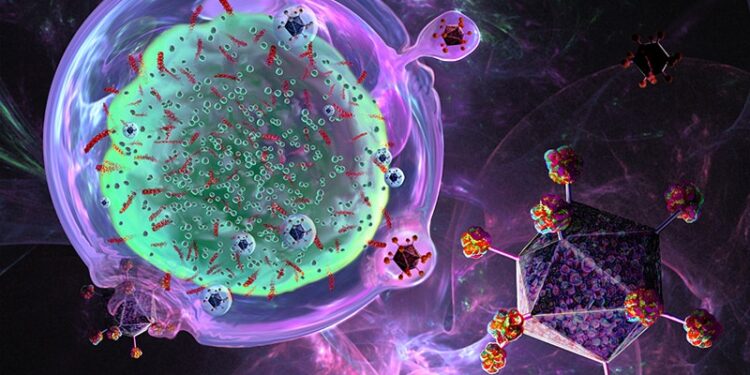TOPLINE:
Genome-wide CRISPR screens in primary human natural killer (NK) cells identified critical checkpoints regulating resistance to immunosuppressive pressures in the tumor microenvironment. Targeted knockout of MED12, ARIH2, and CCNC enhanced NK cell antitumor activity against multiple treatment-refractory human cancers, improving both innate and chimeric antigen receptor (CAR)-mediated NK cell function.
METHODOLOGY:
- Researchers performed multiple genome-wide CRISPR screens in primary human NK cells to identify critical checkpoints regulating resistance to immunosuppressive pressures.
- Analysis included screening of 19,281 genes using 77,736 unique guide RNA sequences along with 500 nontargeting control guides.
- Investigation focused on ablation of MED12, ARIH2, and CCNC to improve NK cell antitumor activity against multiple treatment-refractory human cancers both in vitro and in vivo.
- Evaluation encompassed both innate and CAR-mediated NK cell function, examining metabolic fitness, proinflammatory cytokine secretion, and expansion of cytotoxic NK cell subsets.
TAKEAWAY:
- Genome-wide CRISPR screens identified critical checkpoints regulating NK cell resistance to immunosuppressive pressures in the tumor microenvironment.
- Ablation of MED12, ARIH2, and CCNC significantly enhanced NK cell antitumor activity against multiple treatment-refractory human cancers.
- CRISPR editing augmented both innate and CAR-mediated NK cell function, leading to improved metabolic fitness and increased proinflammatory cytokine secretion.
- The study revealed critical regulators of NK cell function, providing a valuable resource for engineering next-generation NK cell therapies with improved efficacy against cancer.
IN PRACTICE:
“While recent single-cell multiomics studies and CRISPR screens in murine NK cells have expanded our understanding, actionable genomic targets in primary human NK cells have remained largely unexplored. Bridging this gap, in this study we conducted a genome-wide CRISPR knockout screen in primary human NK cells under diverse clinically relevant experimental conditions,” the authors of the study wrote.
SOURCE:
This study was led by Alexander Biederstädt, Rafet Basar, and Katayoun Rezvani, The University of Texas MD Anderson Cancer Center, Houston. It was published online in Cancer Cell.
LIMITATIONS:
According to the authors, the study was unable to detect genes with functional paralogs, highlighting the need for combinatorial screens to uncover epistatic interactions. Additionally, epigenetic NK cell regulation governing transcriptional activation remained unexplored and warrants future studies using nonheritable CRISPR editors. The researchers also noted that synthetic gene programs not physiologically expressed by NK cells were not assessed in their platform and will require pooled knockin strategies — genome-editing techniques that employ DNA repair mechanism to insert desirable genetic sequences into specific locations.
DISCLOSURES:
This study received support from The University of Texas MD Anderson Cancer Center Institute for Cell Therapy Discovery and Innovation, with contributions from multiple foundations including the Meg and Kirk Gentle, Lindonlight Collective, The Marcus Foundation, Inc., The Margery L. Block Foundation, Melville Foundation and Tanoto Foundation. Additional funding came from grants from the National Institutes of Health and the Specialized Program of Research Excellence in Ovarian Cancer and Brain Cancer.
This article was created using several editorial tools, including AI, as part of the process. Human editors reviewed this content before publication.
Source link : https://www.medscape.com/viewarticle/can-crispr-help-nk-cells-fight-cancer-2025a1000mbl?src=rss
Author :
Publish date : 2025-08-25 08:48:00
Copyright for syndicated content belongs to the linked Source.














